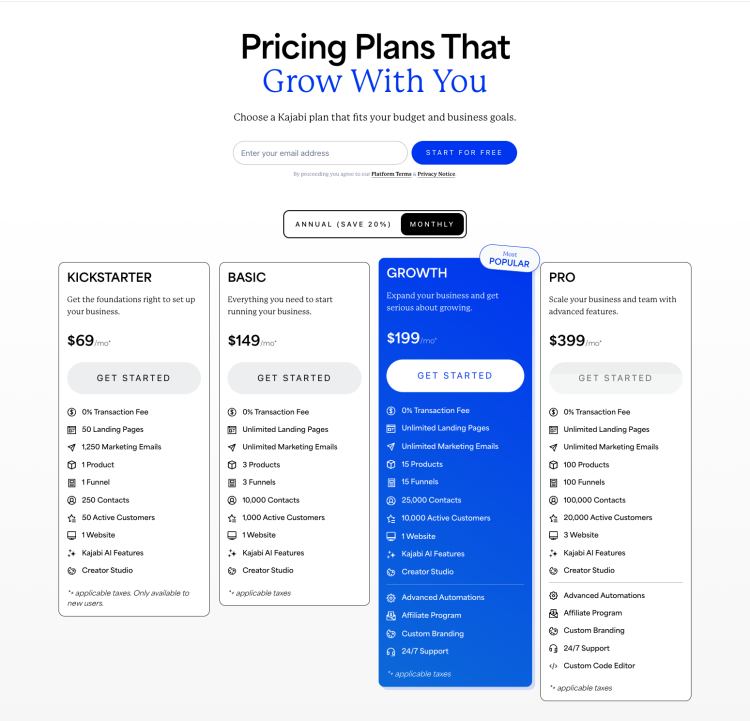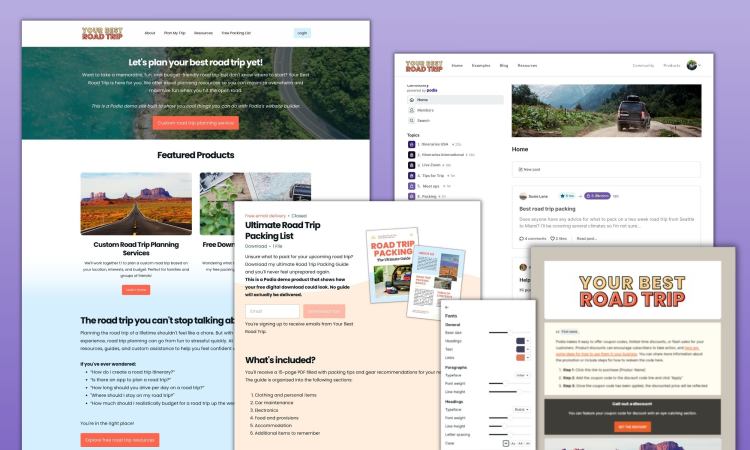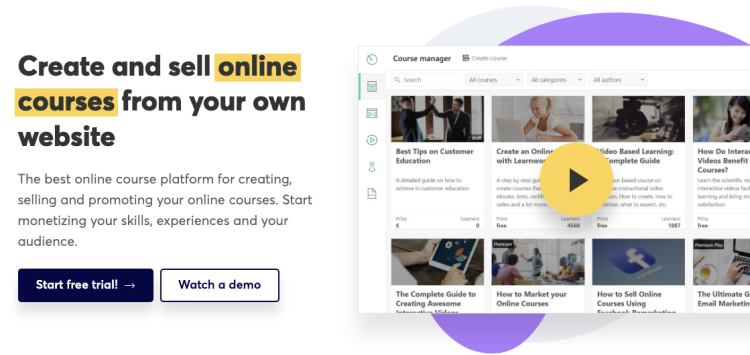Our view at Stack - Podia shines with its all-in-one platform for digital commerce, offering zero transaction fees, email marketing, affiliate marketing, and live chat support. It’s known for unlimited courses and products, embeddable checkouts, and a community feature to engage users. It now has blog functionality also.
Can you think of two creators that are exactly alike?
Some creators go viral on YouTube and make money off ads and sponsorships. Some sell printable planners with funny cat illustrations. Others offer 1:1 online music lessons alongside self-study musical theory courses.
There are endless ways creative businesses can come to life. Entrepreneurial journeys are diverse, and it makes sense that there are hundreds of different tools to support creators behind the scenes.
One of these tools is Kajabi, an all-in-one platform for selling digital products and running an online business.
In this guide, we’ll break down the pros and cons of Kajabi, as well as 12 Kajabi alternatives you can use to help you reach your goals.
Note: All pricing is accurate at the time of writing, but this is subject to change over time.
Kajabi pros and cons
With Kajabi, you can sell courses, downloads, coaching, podcasts, memberships, and communities. You can also use Kajabi to handle email marketing, create a website, build sales funnels (called pipelines), and manage affiliates.
Kajabi even comes with a mobile app so students can view courses on the go. On top of that, there are no transaction fees, so you’ll keep everything you earn.
So what’s the catch?
No platform is perfect for every creator, Kajabi included.
Here are some potential downsides of Kajabi:
First, Kajabi comes with a premium price tag. Compared to the other platforms we’ll discuss in this guide, Kajabi is one of the most expensive options for this type of software.
Kajabi costs:
-
Kickstarter: $69/month
-
Basic: $149/month
-
Growth: $199/month
-
Pro: $399/month
Even the lowest-tiered Basic plan is over $100 per month, which could be cost-prohibitive for creators on a budget.
In addition to having a higher price point, Kajabi imposes product limits on all plans.
Kajabi product limits:
-
Kickstarter plan: one product and one pipeline
-
Basic plan: three products and three pipelines
-
Growth plan: 15 products and 15 pipelines
-
Pro plan: 100 products and 100 pipelines

According to our 900+ creator survey, creators have an average of 10.95 products, which means many would have to use Kajabi’s Growth plan or Pro plan to keep selling their work.
Finally, Kajabi doesn’t have course completion certificates built-in, so if you want to offer this to students, you’ll need to integrate with a third-party tool.
If you’re on the fence about Kajabi, here are 12 alternatives you can try instead.
12 best alternatives to Kajabi
1. Podia

Podia is an all-in-one platform where you can build, host, and manage every aspect of your business. You can create and sell unlimited courses, digital downloads, coaching, and more on Podia’s Mover and Shaker plans. With unlimited students, sales, and bandwidth, you won’t have to worry about upgrading as your business grows.
Our intuitive website builder means you won’t need to learn to code or invest in additional website tools to get your business up and running. You can easily create beautiful, effective sales pages for each item you sell.
For example, singer and actor Harry Connick Jr. uses Podia to run his paid piano membership, Piano Party. Students get access to a series of video lessons and a supportive community to meet friends and share their wins.

Podia creator Emily Mills from Sketch Academy uses Podia to sell courses, workshops, workbooks, and 1:1 coaching.

Podia includes email marketing, affiliate management, and the ability to message prospective customers, so you don’t have to pay for extra tools and software. Users can also issue course completion certificates for students.
Here’s a look at some of our creators’ favorite features:
Podia features:
-
Sell unlimited courses, digital downloads, webinars, and coaching sessions
-
Easy-to-use website builder included on all plans
-
Built-in email marketing, affiliate marketing, and customer messaging
-
Free migrations when you sign up for an annual Mover or Shaker plan
-
Excellent customer support
-
Instant payouts
-
Payment integrations with Stripe and PayPal
-
Custom domains
Whether you’re brand new or a veteran creator, you’ll get everything you need in one affordable platform.
Podia pricing:
Learn more about how Podia compares to Kajabi.
Get your free 30-day trial now to see these features in action.
2. Teachable

Teachable is a popular choice for coaches and course creators. With Teachable, paid plan participants get unlimited courses, coaching products, students, and video bandwidth.
You can build custom sales pages, detailed checkout pages, and even a homepage where all your products can live.
There are many ways creators can price their products and courses, and it’s possible to receive instant payouts. If you have partners, collaborators, or affiliates, Teachable makes sure everyone gets paid the right amount.
Teachable features:
-
Sell unlimited courses and coaching products
-
Build a custom storefront and sales pages
-
Course competition certificates and progress tracking
-
Affiliate center with automatic payouts
-
Dozens of powerful integrations
-
Email marketing features
Teachable benefits:
Teachable is built for selling courses and coaching, and creators can use design templates, quizzes, drip content, upsells, and course compliance enforcement. Also, Teachable users can add CSS code snippets to their school pages on all plans, including free plans.
Teachable downsides:
Teachable doesn’t come with a built-in community. If you want this functionality, you’ll need to integrate with an additional tool, which may come at an extra cost.
The included email marketing system lacks advanced features, and there are also transaction fees on the Free and Basic plans.
Teachable pricing:
3. Thinkific

Like Teachable, the Thinkific platform serves course creators. Through Thinkific, you can sell self-study courses, live lessons, videos, and cohort programs. Easily add assessments and give students an assortment of payment structures to choose from.
You can also use Thinkific to build a storefront or website for your business, complete with templates to help you get started. Thinkific also offers course completion certificates, assignments, and lesson prerequisites.
Thinkific features:
-
Sell courses, communities, products, bundles, and memberships
-
Voiceover PowerPoint presentation tool built-in
-
Student surveys
-
Students can leave course reviews
-
Exam integrations on higher plans
-
Video and content hosting on all plans
Thinkific benefits:
Thinkific creators get unlimited courses, content, and students on paid plans. For advanced users, custom CSS and HTML are available on Thinkific’s $99/month Pro plan. With Kajabi, this functionality is only available on the $399/month Pro plan.
Thinkific downsides:
Creators can only offer memberships, product bundles, payment plans, and subscriptions on Pro plans and above. Email features are limited, and basic communities are only available on higher-tiered plans.
Also, you can’t use Zapier triggers unless you purchase the Thinkific Growth add-on, which costs $50 and must be used in conjunction with the $99/month Pro plan.
Thinkific pricing:
With Thinkific, there are no transaction fees, even on the free plan.
-
Free
-
Basic: $49/month
-
Pro: $99/month
-
Premier: $499/month
4. LearnWorlds

LearnWorlds is a platform where educators, entrepreneurs, and small to mid-sized businesses can build and sell online courses, memberships, and even mobile learning apps.
LearnWorlds also comes with a handy website builder. Customize your site however you like, and duplicate pages if you want to experiment with a new look.
One of the biggest perks of LearnWorlds is that you can build your own mobile app for your brand or business. You can offer in-app purchases, send notifications, and even create a fully white-label experience.
The LearnWorlds mobile app builder tool is available as a paid add-on for Learning Center members. There’s an extra cost for this service, but the price isn’t listed online.
LearnWorlds features:
-
Sell courses, memberships, subscriptions, and product bundles
-
Manage affiliates
-
Build your own website
-
Built-in video editing tools and transcripts
-
Create a mobile app for your brand (additional fee)
-
Add assessments, quizzes, question banks, and course completion certificates
LearnWorlds benefits:
LearnWorlds makes it easy for content creators to create engaging videos through built-in video editing tools and features. For students, LearnWorlds offers interactive add-ons like notetaking and highlighting within the course viewer.
LearnWorlds downsides:
LearnWorlds heavily focuses on course creation, so it may not be the right fit for creators who plan to sell digital downloads, coaching, communities, and services.
Starter plan members will pay a flat transaction fee of $5 per course sale, which could severely eat into your earnings for lower-priced courses. Also, free courses, memberships, and subscriptions can only be offered on the $99/month Pro Trainer plan and above.
LearnWorlds pricing:
-
Starter: $29/month (+$5 fee per course sale)
-
Pro Trainer: $99/month
-
Learning Center: $299/month
-
Corporate: Custom pricing
5. Teachery

Teachery is a straightforward online course platform for creators who don’t need a lot of bells and whistles. Utilize their user-friendly course builder to create as many lessons and modules as you like, and you can even duplicate courses if you want to run them more than once.
There are only two pricing options, and both pricing plans include unlimited students and courses. There aren’t any product upsells or add-ons; one flat rate gives you access to the entire tool.
Teachery features:
-
Unlimited courses, lessons, and students
-
Simple course editor
-
Build sales pages and landing pages to promote your products
-
Choose from two templates, minimal and sidebar
-
Whitelabel course provider
-
Memberships and product bundles
-
Mailchimp and ConvertKit integrations
-
Tools to create an affiliate program
Teachery benefits:
Teachery is ideal for course creators who want a minimalist platform that’s simple and easy to use. You’ll have everything you need to sell unlimited courses without a ton of extra features, which keeps costs affordable.
Teachery downsides:
With Teachery, you won’t get a website, storefront, or email marketing features. Teachery also doesn’t include video and audio file hosting. Instead, you’ll need to embed content through third-party tools like YouTube and Vimeo.
Teachery pricing:
-
Monthly plan: $49/month
-
Annual plan: $470/year
6. LearnDash

LearnDash is a WordPress learning management system (LMS) plugin that must be used with a WordPress website. Through LearnDash, you’ll get access to a drag and drop course builder and dozens of customization options to build your learning environment.
Create unlimited courses, host unlimited learners, and house it all on your WordPress site. You can also create course content with interactive elements like quizzes, leaderboards, gamification, and assignments.
LearnDash features:
-
WordPress LMS plugin
-
Enroll unlimited students and sell unlimited courses from your own website
-
Works with any WordPress theme
-
One-time purchases, subscriptions, memberships, course bundles, and bulk licenses
-
Gamification, quizzes, certifications, and evaluations
-
Send students notifications
LearnDash benefits:
The main benefit of the LearnDash WordPress plugin is how customizable it is. You can build whatever kind of website you want using the WordPress framework, add LearnDash to your existing site, and incorporate other add-ons and plugins to get additional functionality.
You also won’t pay any transaction fees on LearnDash course sales.
LearnDash downsides:
If you sell courses through LearnDash, you should be familiar with WordPress and comfortable connecting multiple plugins and integrations. Since WordPress has a learning curve, it may take longer to get your courses up and running.
You might want to hire a developer or web designer to bring your site to life, which comes with additional costs.
While a flat yearly price and no transaction fees might sound enticing, it’s important to remember that some tools are only available as paid add-ons. Combine that with the cost of hosting your website and domain fees, and this option can get pricey.
Also, if your technology starts acting up, you’ll be the one who has to troubleshoot a fix.
LearnDash pricing:
7. Mighty Networks

Mighty Networks is an online community platform. Here, creators can run free and paid membership communities and, on higher-tiered plans, sell online courses.
Mighty Networks makes it possible to create landing pages and offer a variety of payment plans for community access. Advanced community features include live streams, member profiles, direct messaging, virtual events, and calendar functionality.
Mighty Networks features:
-
Community and membership site features
-
Users have unique feeds through personalization technology
-
Communities can have unlimited members and moderators
-
Group and private chat messaging
-
Create live or cohort courses on the Business plan and up
Mighty Networks benefits:
Mighty Networks was designed for running communities, and creators get access to analytics and other helpful membership tools. You can also create courses with a dedicated community area.
Mighty Networks downsides:
The online course creation feature is only available on the $119/month Business plan and above. There isn’t a native way to sell services like coaching and 1:1 tutoring, so you may need additional tools if you plan to offer these products.
Mighty Networks users also pay a 3% or 2% transaction fee, depending on the plan.
Mighty Networks pricing:
-
Community plan: $39/month
-
Business plan: $119/month
-
Mighty Pro: Custom pricing
8. ClickFunnels

ClickFunnels is sales funnel software. Creators can build marketing automations that take visitors through sales pages and email nurture sequences designed to convert them into customers. Creators can also build strategic upsells, order bumps, and tripwires.
ClickFunnels is not marketed as a course provider, but it’s possible to deliver content through the password-protected membership feature. With over 100K users, this is a popular choice for entrepreneurs who depend on sales funnels to automate their business.
ClickFunnels features:
-
Page builder for creating sales pages and shopping cart pages
-
Autoresponders, upsells, cross-sells, order bumps, and tripwires
-
Built-in affiliate system
-
Email marketing tools with advanced segmentation capabilities
ClickFunnels benefits:
Creators can use ClickFunnels to build in-depth sales funnels as well as web pages and landing pages. There are also special funnel templates for generating leads, closing sales, and running webinar events.
ClickFunnels downsides:
While you can offer courses through the ClickFunnel membership area, this tool wasn’t built for selling courses directly. If you don’t use elaborate sales funnels in your business, ClickFunnels comes with many features you won’t need.
It’s common for creators to use ClickFunnels as their marketing platform and another tool to host their elearning content, which means additional costs.
ClickFunnels pricing:
9. Kartra

Kartra is an all-in-one marketing platform where creators can build checkout carts, sales pages, funnels, and campaigns. Sell memberships, gather leads, manage your email list, and schedule live sessions with customers directly on the platform.
While Kartra isn’t specifically designed for selling courses and digital products, it’s possible to do so through drip content or adding resources to a paid membership area. Kartra also offers extra video enhancements like email capture pop-ups, watermarks, and playlists.
Kartra features:
-
Creators can make a helpdesk for their customers
-
Calendar scheduling tool built-in
-
Built-in surveys and quizzes to do customer research
-
Lead capture forms and client organization tools
-
Affiliate marketing tools
-
Agency tools to manage all your clients if you offer services
Kartra benefits:
Compared to Kajabi, Kartra excels because it offers appointment scheduling and calendar tools. There’s also a customer helpdesk feature so creators can provide customer support to their clients.
For affiliates, Karta has pre-screening questions, automated payouts, and an affiliate marketplace to find new promoters.
Kartra downsides:
Kartra doesn’t have a dedicated course builder, so you’ll have to use memberships as a workaround for delivering content. Kartra also lacks a community feature, so you’ll need to use a third-party tool if you want this functionality.
Kartra pricing:
-
Starter: $99/month
-
Silver: $199/month
-
Gold: $299/month
-
Platinum: $499/month
10. Ruzuku

Ruzuku is a simple platform for building and selling online courses. Create any type of course you want with unlimited video, audio, and file hosting using the intuitive Ruzuku course builder.
Courses can be evergreen, self-paced, or live, and you can create a copy of a course if you’d like to use the material again.
Ruzuku features:
-
Unlimited students and courses, data storage, no transaction fees
-
Webinars, polls, and quizzes on some plans
-
Engage students through forums, commenting, and prompts
-
Video hosting is included on all plans
Ruzuku benefits:
Ruzuku has robust features for course sellers, including video and audio hosting, teleconferences, video broadcasts, course completion data, an FAQ forum area, and student discussions.
Across the board, Ruzuku gets great reviews for simplicity and customer service. There are no transaction fees on any plans.
Ruzuku downsides:
Ruzuku is great for creators who want the basics, but you’ll need to connect other tools to offer affiliates, communities, or memberships. Ruzuku doesn’t come with a website builder, so this could be another puzzle piece to consider.
Ruzuku pricing:
-
Bootstrapper: $99/month
-
Up and Comer: $149/month
-
University: $199/month
11. Skillshare

Skillshare is different from the other Kajabi competitors on this list because it’s a learning membership platform. Rather than building a home base for your online business, Skillshare allows you to upload your content and get discovered by their large pool of learners.
To use Skillshare, students pay a monthly fee for unlimited access to all courses on the platform. Creators record and upload video courses, and any Skillshare member can enjoy the content.
Courses usually last 30-40 minutes and come with a project or assignment to enhance student engagement. All content also must pass video quality control standards and approval.
Teachers earn royalties based on how many minutes students watch their courses. Teachers can also earn referral bonuses when a student signs up for Skillshare using their unique link.
Skillshare features:
-
Upload video courses and make money through royalties
-
Earn more through the Skillshare affiliate program
-
Creators can be discovered by students already using the platform
Skillshare benefits:
With Skillshare, you don’t have to do your own marketing since users can find you by searching for your content on Skillshare. You can earn more by sending students to the platform with your referral code, but it’s still possible to earn royalties without any promotion.
Also, there are no recurring fees or websites to maintain. This is a good option for creators who don’t want to offer live courses and who want minimum work behind the scenes.
Skillshare downsides:
On Skillshare, you can’t set the price for your course, and your content will be hosted on Skillshare’s platform instead of on a website that you own.
You’ll get paid based on how many minutes of content people watch, which could mean lower earnings than if you sold your courses independently.
Skillshare courses must be pre-recorded video sessions with a project for students to complete at the end. This format may be stifling for creators who have another course type in mind, like real-time cohorts or ongoing memberships.
Skillshare pricing:
-
Free for creators
12. Udemy

Udemy is a course marketplace website where you can list courses and reach a wide audience. They help with marketing, but in return, you give up control over elements of your course.
Teachers get paid through a revenue-sharing plan. When a student enrolls using the instructor’s referral code, the instructor keeps 97% of the course fee. If a student enrolls without using a referral code, the instructor only keeps 37%.
Udemy is also known for offering price reductions on courses site-wide, but creators can opt out of this if they don’t want their content to be discounted.
Udemy features:
-
Easy course builder and uploader tool
-
World-wide student base
-
Students can leave course reviews to build credibility
-
Users can gift courses to other people
-
Instructors can create coupons for their courses or be included in site-wide deals
Udemy benefits:
Selling courses on Udemy can be hands-off if you don’t want to deal with your own marketing. Because of the platform’s size, you have the potential to get your course in front of a large number of students relatively quickly.
Udemy downsides:
Udemy is free to use, but you won’t get a website, sales pages, email tools, or the ability to sell diverse product types like memberships, coaching, and digital downloads.
Udemy takes a large percentage of your sales unless students use your affiliate code. This can make it difficult to earn a living on the platform and grow your business.
For example, Podia creator John D. Saunders had over 1,900 customers buy his courses on Udemy, but he only earned $1,100 in revenue. When he switched to Podia, he earned $10,000 on launch day alone and has earned over $200,000 on the platform since.
Finally, all videos must be approved by Udemy before you can start selling. If they’re not formatted correctly, they could be rejected, and you’d have to start over.
Udemy pricing:
-
Free for creators
Find the right Kajabi alternative for you
Best free alternative to Kajabi:
More affordable Kajabi alternatives:
-
Podia: Plans start at $33/month
-
Teachable: Limited free plan, paid plans start at $39/month
-
Thinkific: Limited free plan, paid plans start at $49/month
-
LearnWorlds: Plans start at $29/month
-
Teachery: Plans start at $49/month
-
LearnDash: Plans start at $199/year
-
Mighty Networks: Plans start at $39/month
-
ClickFunnels: Plans start at $97/month
-
Kartra: Plans start at $99/month
-
Ruzuku: Plans start at $99/month
Best Kajabi alternatives that integrate with WordPress:
Best all-in-one alternative to Kajabi: Podia
Podia gives you everything you need to run your entire online business, no matter where your creativity takes you. If you’re looking for a place to sell unlimited products without breaking the bank, we’d love for you to join us at Podia.
To see how Podia can meet your creative needs, sign up for your free 30-day trial today.
We can’t wait to see all the awesome things you make.
If Podia is of interest and you'd like more information, please do make contact or take a look in more detail here.
Credit: Original article published here.
